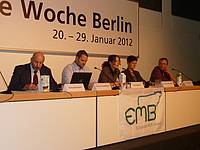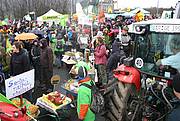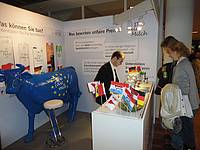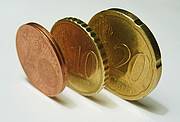EMB Newsletter February 2012
Newsletter as PDF
Contact
European Milk Board
Bahnhofstr. 31
D-59065 Hamm
Phone: 0049/2381/4360495
Fax: 0049/2381/4361153
E-Mail: office@europeanmilkboard.org
Website: http://www.europeanmilkboard.org
Newsletter as PDF
Contact
EMB - European Milk Board asbl
Rue de la Loi 155
B-1040 Bruxelles
Phone: +32 - 2808 - 1935
Fax: +32 - 2808 - 8265
Dear Dairy Farmers and Interested Parties,
In January my colleagues from the EMB Board and I spent a few days at the International Green Week in Berlin. This huge agricultural trade show is truly a consumer fair. Thousands of visitors meet the exhibitors, dealers and retailers as well as farmers there and can find out how their food is produced and sample the products – at the EMB’s Fair Milk Stand, for instance.
Many decision-makers from the world of politics and industry also attend the Green Week supporting programme – grabbing photo opportunities in front of the big tractors and taking part in press conferences and round-table discussions.
At the numerous events I visited, one thing became very clear to me: whilst the supposedly intact world of agriculture is presented by and large on the trade fair stands, the players in the agricultural market are very aware of the existing problems. Such as the speakers at the opening ceremony of the fair. Without exception they spoke of the negative consequences of selling agricultural products below production costs, the uneven margin distribution and the consumers’ responsibility when shopping. What a shame that, once the fine speeches are over, people care only about the income of top managers in retail and industry, instead of taking the European consumers’ concerns seriously.
To date far too few of the changes that are needed in the farming sector have been put in place and the wait is far too long! This point was driven home by EU Commissioner Dacian Ciolos in the Citizens’ Dialogue organised by the “My Agriculture” initiative at Green Week. Although he promised to insist on his demands for family farms and more sustainable agriculture in the agricultural reform, at the same time he warned us not to expect too much of the EU agricultural reform. The EU members states were, he said, like an elephant that needs to change direction: “How can you make an elephant get a move on?” Pushing and pulling it would be no good. “If you dangle something tasty under his trunk, he‘ll start moving.”
This elephant is ambling along too slowly for the European farmers’ and consumers’ liking. That was made clear by the 23,000(!) demonstrators who marched through the German capital during Green Week in the “We’ve had enough” demonstration.
With so many committed supporters there is increasing hope that the elephant will perhaps “step on it” in future!
Kind regards,
Sieta van Keimpema
(Vice-President of the EMB)
The same goes for the financial markets and the dairy market: there must be clear rules! – A proposed solution for European milk supply
Hamm/Berlin, January 19th 2012: The international finance and debt problems make it clear: free market forces create dangerous turbulence, plunging the sector deep into crisis. The same goes for the dairy market. It is now in a state of frenzy, and the planned deregulation measures – such as the abolition of quotas in 2015 – will push it even further towards ruin. The trend is towards rock-bottom prices that fluctuate dramatically and the milk producers’ greater dependency on dairy groups and banks. Clear rules are needed that guarantee the operation of a healthy market.
“Not just a flash in the pan!” – More than 20,000 demonstrate again in Berlin for a new agricultural policy
“We’ve had enough! Farms – Yes; industrial agriculture – No!” That was the cry of 23,000 men and women who marched through the streets of Berlin to the Chancellor’s office on 21 January in spite of ice-cold temperatures and sleet. They wanted to send out a message during the International Green Week. The demonstrators included many consumers, people from environmental protection and animal welfare groups, beekeepers and farmers. Their aim: a reform of the agricultural policy. A stop has to be put to food and animal feed scandals, cruelty to animals in the “agricultural factories” and GM food on our plates. More than 20,000 people had already taken to the streets of Berlin to raise this issue back in January 2011.
“Good and fair in Europe” – joint Fair Milk Stand at the International Green Week in Berlin
The European Milk Board was represented at the International Green Week in Berlin from 20 to 29 January 2012 with a joint stand shared by the Fair Milk countries Austria, Germany, Belgium, Luxembourg and the Netherlands. At the world’s biggest food industry and agricultural products consumer fair, the EMB presented the different varieties of milk in the European Fair Milk range and informed consumers of the necessity for a cost-covering farm-gate price.
New Minister receptive to the Belgian dairy farmers’ concerns
At a consultation with the milk producers in Belgium’s Walloon Regional Parliament on 24 January the new Minister of Agriculture Carlo di Antonio showed interest in the milk producers’ problems.During the consultation it quickly became clear that the politicians were by and large totally unaware of the Belgian dairy farmers’ plight. One of the reasons why, according to Erwin Schöpges, President of the MIG and a member of the EMB Board, is the lack of communication between producers and politicians: “Generally speaking, milk producers are not invited to consultations on agriculture and so far there has hardly been any debate on the issue in Belgium”, says Schöpges.
Milk prices in 2011
In its Milk Price Comparison the EMB regularly shows the farm-gate prices paid by various dairies in Europe. You can see these statistics in detail at http://www.europeanmilkboard.org/en/emb/milk-price-review.html. Here is a brief synopsis of what the dairies paid in 2011.
When differences turn into strengths - Interview with an EMB staffer who was there from the very beginning
Sonja Korspeter worked many years as director and policy officer for the EMB. Early in 2012 she will leave the EMB to face new challenges.
A good reason for us, to ask her some questions about her time here with us.
Silvia Däberitz: Sonja, you will be leaving your post here in a few days. How did you start working for EMB?
Sonja Korspeter: It was in November 2004 in Hamburg. At the airport Business Center – I was accompanying a French milk producer – there were dairy farmers from seven European countries who had been invited by BDM Nord, and they agreed on the first joint press release. It contained three statements: “First: Together we demand a farm-gate price of at least € 0.40 a kilo of milk. Second: The dairy farmers in Europe can no longer be played off against one another. Third: We are preparing a European milk strike!”
Full Texts
The same goes for the financial markets and the dairy market: there must be clear rules! – A proposed solution for European milk supply
 |
Hamm/Berlin, January 19th 2012: The international finance and debt problems make it clear: free market forces create dangerous turbulence, plunging the sector deep into crisis. The same goes for the dairy market. It is now in a state of frenzy, and the planned deregulation measures – such as the abolition of quotas in 2015 – will push it even further towards ruin. The trend is towards rock-bottom prices that fluctuate dramatically and the milk producers’ greater dependency on dairy groups and banks. Clear rules are needed that guarantee the operation of a healthy market.
The financial sector cannot operate without efficient financial supervision, transparency and the outlawing of dangerous speculation. In the dairy sector, too, severe structural deficits necessitate wide-reaching measures. In the current situation farmers have no bargaining power and so are unable to adjust their supply to consumer demand in a systematic way.
Lessons and solutions for the dairy market
To strengthen their bargaining position vis-à-vis the processors, members of co-operatives and producers that supply private dairies must be given the opportunity to join a producer organisation that negotiates on their behalf. Such a producer organisation must be able to become as strong in the market as a dairy.
Moreover, a monitoring agency has to be set up to enable supply to be adjusted to demand across the markets. Its remit is to gather key data such as production costs, prices, and the volume of supply and demand. On that basis it calculates volume adjustments, i.e. works out how much has to be produced so that a) supply is geared to demand and b) a cost-covering farm-gate price is achieved for the producers and c) a fair milk price is achieved for the consumers.
Dangerous speculation
Speculation has caused the financial sector to fluctuate with disastrous effects. It is not clear whether the market can recover. It is irresponsible for foodstuffs like milk to be the subject of speculation. According to the World Bank, the so-called silent tsunami – as world food experts call dangerous price rises in staple foods due in part to speculation on food in futures markets – plunged 44 million people into poverty between June 2010 and April 2011.
The financial sector and the dairy sector must be restored to functionality. People’s trust in the markets has been shattered. In future it must be proven that the markets can operate in the interest of our society. And that is only possible with clear rules!
EMB Press release of January 19th 2012





